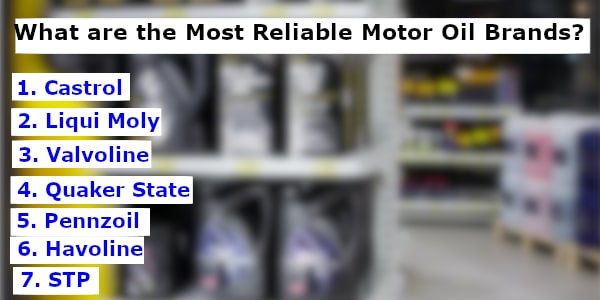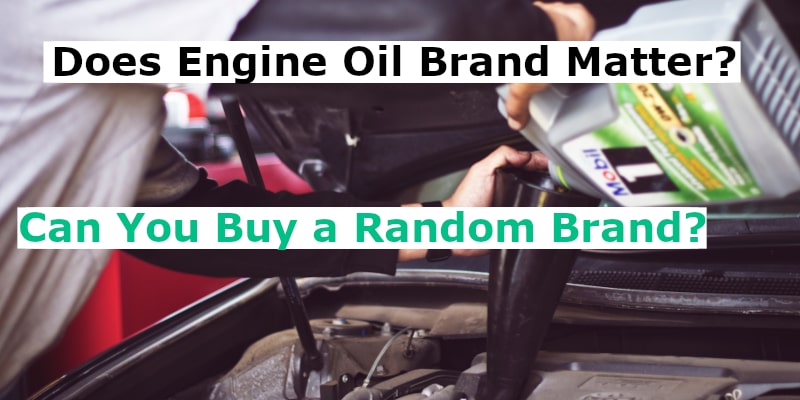There are hundreds of motor oli brands, but do they really matter?
Are all brands the same?
You will find out the answer in this post!
Does Engine Oil Brand Matter?
In general, the brand of motor oil does not matter, so long as you are purchasing your oil from a manufacturer with a strong additive package and the proper certifications. When deciding between top-tier brands like Mobil, Valvoline, or Castrol, the gap between brands narrows even more.
When selecting from high quality motor oils, brand does not affect engine longevity nearly as much as the proper weight of oil, type of oil, and changing oil at the manufacturer’s suggested intervals.
All motor oil, both synthetic and conventional, are manufactured from a “base oil” before being made into different weights and having additives introduced. Many different oil brands source their base oil from the same process and even the same producer.
For all intents and purposes, all base oils of a similar group can be considered identical, as they are held to a very high standard of production. The differences mainly lie in the additive packages mixed in by the end manufacturer, as well as the quality control put into place.
This is the main reason that brand of oil is not overly important. Most oils are overengineered for the majority of oil change intervals in vehicles today.
The main exception would be for high-technology vehicles that call for 10,000-20,000 mile (16,000-32,000km) oil change intervals. In this case a long-life oil from a top-tier brand should be used to ensure the oil holds up over the full interval.
Read it: 18 Cars with Real Leather Seats (with Pictures)
What Matters when Choosing a Motor Oil?
What matters the most when selecting an oil is purchasing the correct weight and type of oil as outlined by a vehicle’s owner’s manual.
Oil weight is particularly important, as oil weight describes an oil’s viscosity. Viscosity is the measurement of how viscous a liquid is or how well it resists deformation during the forces imparted by a running engine. The higher the weight number, the higher the viscosity, i.e., a 30-wt oil is more viscous than a 20-wt oil.
Higher oil viscosities generally provide better lubrication than lower viscosity oils. However, if the engine is designed for a low viscosity oil, an engine may not be able to run well with a higher viscosity oil. This is why it is so important to follow your owner’s manual.
If your car’s owner’s manual suggests 5w-30, use a 5w-30 oil from a well-respected brand. Likewise, if your vehicle calls for 0w-20, use a high-quality 0w-20 oil. While your vehicle may run fine on a different weight of oil, it is generally not worth the risk of engine damage to try this!
The next most important factor is conventional vs. synthetic oil composition. Conventional oil is manufactured from base oil refined directly from crude that is pumped from the ground. Conventional oil is inexpensive but is less uniform (molecule sizes vary naturally) and breaks down more quickly with use.
Trending Video: How to Easily Bring Back to Life any Old Car Battery and Save Tons of Money (click to watch)
Synthetic oil still uses petroleum products from oil wells but is specially formulated in a lab setting to have a very uniform molecule size and generally a higher quality. Because of the production control, a lab setting provides, synthetic oils tend to last for many more miles before breaking down than conventional oils.
If your vehicle runs on diesel fuel, specific diesel oils of the correct weight should be used. These have special additives that help protect an engine from the higher compression forces of the diesel combustion cycle. Oils labeled for diesel use also tend to be more compatible with the chemical makeup of diesel fuel than gasoline.
Likewise, if you have an older vehicle with flat tappet valve lifters rather than more modern roller valve lifters, it is better to use an oil that has a high concentration of zinc. Zinc provides an extra layer of protection between the engine’s camshaft and flat tappet valve lifters to prevent excessive wear.
Have you ever thought about how much is a Lamborghini oil change? Here’s the answer.
Is it Okay to Mix Different Brands of Oil?
It is completely fine to mix brands of oil. Most brands of oil are so similar in performance that differences are not notable, and even less so if mixed together with another brand.
Oil of a certain weight (like 5w-30 or 0w-20), is created to be the same weight as all other oil brands of the same advertised weight.
If you mix oils of different weights, the average of the two weights is achieved. In general, it does not make sense to mix oil weights, as you should generally only use the oil weight specified by the vehicle’s manufacturer.
The additives that oil manufacturers add to a base stock are not present in high enough concentrations to run any risk of a negative chemical reaction within the engine.
You can even mix conventional and synthetic motor oils if necessary or convenient.
You should also know what can happen if you don’t change your motor oil.

Why are Some Oils More Expensive than Others?
Some oils are more expensive than others due to two main reasons: the additive package in the oil and marketing. Certain brands charge more for their oil because of engineering costs, and the belief that the extra design put into their additive packages commands a premium.
Generally, motor oils differ the most from brand to brand due to the additive package selected by the manufacturer.
Additive packages include chemicals added to the base oil such as friction modifiers, zinc, emulsion preventers, shear preventers, as well as countless other possible additives.
These additives help extend engine life, can increase fuel efficiency, and help keep the engine clean.
The other main factor in price is marketing. Certain oil brands spend much more on advertising, whether through television, billboards, print media, or digital media, than others.
These costs are often passed down to the consumer, and marketing is sometimes not indicative of overall quality in terms of cost.
For instance, in the United States, Castrol advertises more than most brands of oil. Castrol generally provides a very high-quality product, but it carries a high price tag due to marketing.
In contrast, Mobil 1 oil is also a very high-quality oil but tends to be less expensive than Castrol because Mobil 1 tends to advertise less than Castrol.
Rather than pay more due to marketing, you can easily find less expensive oils with good additive packages by doing a little bit of research and looking for the certifications the engine requires (as found in the owner’s manual) on the back of the bottle.
With just a bit of knowledge, you can find the perfect balance of cost and protection in a motor oil for your vehicle’s engine.


